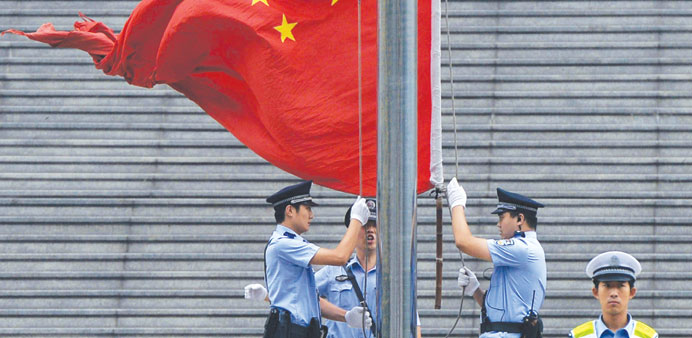|
Chinese state media yesterday hailed the “open” trial and sentencing of deposed regional party leader Bo Xilai as proof of the Communist Party’s commitment to the rule of law. |
Yet critics and international rights groups said the legal process was further evidence of the party’s total control over the judiciary.
“A lot of people speculate that there’s no judicial independence in China, but this case shows just the opposite,” Li Zhaojie, a law professor at Beijing’s Tsinghua University, said after Bo was sentenced to life in prison for corruption, embezzlement and abuse of power.
“Even though the punishment is quite severe, the court still ruled out a certain part of the charges made by the prosecutors, so that shows that this trial is not a show trial,” Li told state broadcaster China Central Television.
State media trumpeted the unprecedented posting online of partial transcripts of the proceedings, and some observers hope that the limited openness will be used in other trials, perhaps spurring improvements in judicial independence.
But Nicolas Bequelin, a Hong Kong-based expert on China for Human Rights Watch, said Bo’s trial was an “elaborate political show” that failed to meet “even minimal standards of due process.”
“The life sentence handed down today ... is the outcome of a political trial, one that failed to provide due process to Bo, failed to provide justice to his victims, and failed to provide the truth about his abuses of power to the Chinese public,” Bequelin said.
Zhang Ming, a political scientist at People’s University in Beijing, said the Communist Party also failed in its attempt to show Bo to his supporters as a disgraced and corrupt politician.
“They want to make him disappear from political life. However, this might not be achieved,” Zhang said.
“They attempted to destroy his reputation with his supporters through this trial, but they failed,” Zhang said. “His performance in court was mainly a show for his supporters.”
In photographs published by the court and state media, Bo stood in the front of the judges yesterday, holding a sheaf of papers and flanked by uniformed police officers wearing white gloves.
The home page of people.com.cn, the website of the party’s official newspaper, People’s Daily, showed a later close-up of Bo handcuffed as the police officers gripped his shoulders and forearms.
This position appeared to reflect the traditional Chinese practice of symbolising guilt by binding a convicted criminal at the moment of sentencing, but no explanation was given in the official accounts.
It was not reported if Bo spoke in court yesterday, or if he planned to appeal his sentence.
According to the transcripts of the trial, Bo upstaged the prosecutors with his robust defence, exposing some of the many gaps and contradictions in their evidence.
Bo said party investigators had persuaded him to confess against his will, but the court on Sunday rejected his call for it to rule that his confession was inadmissible evidence.
“They just don’t know Bo’s personality well enough, so they messed up,” Zhang Lifan, a Beijing-based political commentator, said of the prosecutors.
“The case itself, its social influence and its influence on public opinion are not ideal (for the party),” Zhang said.
“From a legal point of view, a second trial (appeal) is inevitable, but anyway the result will be the same since it is essentially a political case,” he said.
Li agreed that the possibility of Bo winning any appeal to a higher court is “very, very low.”
He linked the trial to party leader Xi Jinping’s recent drive to bring down all levels of corrupt officials “from tigers to flies.”
Bo is a “strong tiger,” part of China’s “ruling elite,” Li told CCTV.
Corruption is “a matter of life and death for the country, for the ruling party,” he said, echoing a phrase used by former leader Jiang Zemin in 2001 and now by Xi.
The party wanted to show the world that “Chinese officials are mostly clean, regardless of the fact that they are embedded in a corrupt system,” political dissident Bao Tong said in a commentary on Bo’s trial for US-based Radio Free Asia.
Bao is a former top aide to Zhao Ziyang, who was purged from his post of party secretary in 1989 after he opposed the use of force against democracy protesters.
The party used Bo’s trial to show that “the Chinese justice system is open and fair, regardless of the fact that the party is above the law,” wrote Bao, who lives under house arrest in Beijing.
“To sum up, it was all about supporting the one-party dictatorship and glorifying the ‘China model’,” Bao said. - DPA

